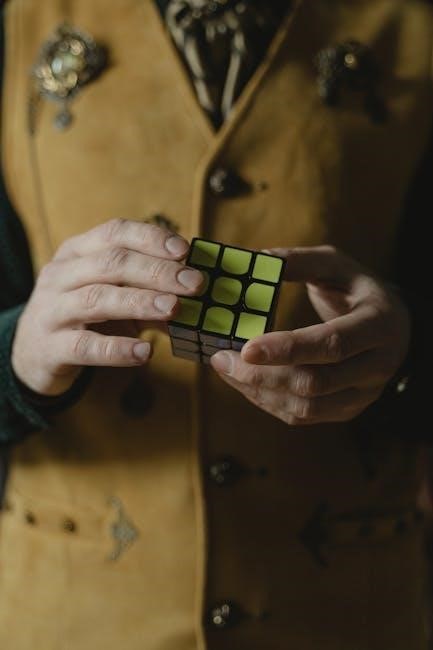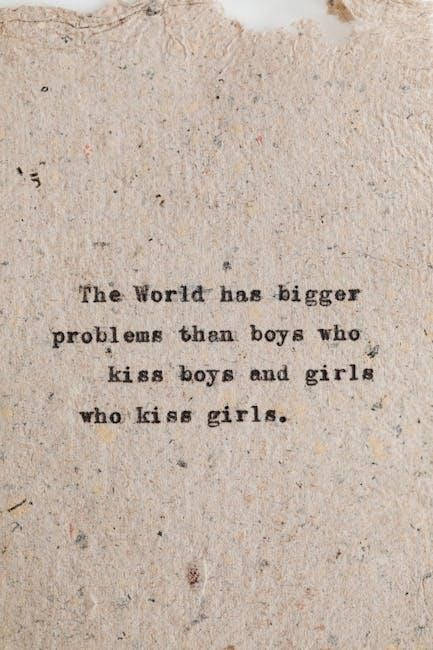MOEMS contest problems are carefully designed to challenge students’ mathematical thinking and problem-solving skills․ These problems cover various topics like geometry‚ algebra‚ counting‚ and probability‚ fostering critical thinking and creativity․ By engaging with MOEMS problems‚ students develop a deeper understanding of mathematical concepts and improve their ability to approach complex challenges․ The contests aim to inspire a love for mathematics and prepare students for advanced problem-solving in their academic and professional careers․
Overview of MOEMS and Its Importance
MOEMS‚ or Math Olympiad for Elementary and Middle Schools‚ is a prestigious competition fostering mathematical excellence in students․ It features problems in geometry‚ algebra‚ counting‚ and probability‚ designed to enhance critical thinking and creativity․ The importance of MOEMS lies in its ability to develop problem-solving skills‚ logical reasoning‚ and a competitive spirit․ With resources like study guides and past papers available‚ students can effectively prepare․ Participating in MOEMS not only enriches mathematical knowledge but also opens doors to college opportunities and scholarships‚ making it a valuable experience for young scholars․
Structure of MOEMS Contest Problems
MOEMS contest problems are structured to test a range of mathematical skills‚ with questions categorized into geometry‚ algebra‚ counting‚ and probability․ Problems are typically multiple-choice or short-answer‚ varying in difficulty․ The contests are divided into sections‚ with earlier problems focusing on foundational concepts and later ones requiring advanced techniques․ The structure ensures a balanced assessment of mathematical knowledge and problem-solving abilities; Understanding this structure helps students prioritize their study areas and manage time effectively during the contest‚ making it a key factor in achieving success․

Types of Problems in MOEMS Contests
MOEMS contests feature diverse problem types‚ including geometry‚ algebra‚ counting‚ probability‚ and trigonometry․ These categories test various mathematical skills‚ ensuring a comprehensive assessment of problem-solving abilities․
Geometry Problems
Geometry problems in MOEMS contests often involve shapes‚ angles‚ and spatial relationships․ These problems require students to apply concepts like area‚ perimeter‚ and volume․ They may also involve proofs or constructions․ Students must use visualization skills and sometimes coordinate geometry to solve them․ Practice with diagrams and geometric theorems is essential․ Geometry problems test spatial reasoning and logical thinking‚ preparing students for advanced math concepts․ Regular practice with geometry-specific resources‚ like those from Dr․ George Lenchner‚ helps build confidence and accuracy in solving these challenging problems․
Algebra and Number Theory Problems
Algebra and number theory problems in MOEMS contests involve equations‚ factoring‚ and properties of numbers․ These problems test a student’s ability to manipulate algebraic expressions‚ solve equations‚ and understand concepts like divisibility and prime numbers․ They often require logical reasoning and the application of fundamental number theory principles․ Regular practice with algebra-focused resources helps students master these skills‚ essential for more advanced mathematical studies․ Engaging with these problems enhances critical thinking and mathematical reasoning‚ preparing students for future academic challenges in algebra and related fields․
Counting and Probability Problems
Counting and probability problems in MOEMS contests test students’ understanding of combinatorial principles and probabilistic events․ These problems often involve calculating the number of ways to arrange objects or determining the likelihood of specific outcomes․ By practicing these problems‚ students develop skills in applying conditional probability and analyzing complex scenarios․ Such exercises enhance mathematical reasoning and strategic thinking‚ preparing participants for real-world applications of probability and statistics․ Regular engagement with these problems helps build confidence in handling uncertain events and making data-driven decisions․
Trigonometry and Advanced Topics
Trigonometry and advanced topics in MOEMS contests introduce students to complex mathematical concepts‚ challenging their understanding of trigonometric functions and their applications․ Problems often involve solving equations involving sine‚ cosine‚ and tangent‚ as well as applying identities and theorems․ These questions require a strong foundation in geometry and algebra‚ as they frequently involve analyzing triangles‚ waves‚ and periodic phenomena․ Advanced topics may also incorporate calculus and number theory‚ pushing students to think critically and creatively․ By mastering these problems‚ participants develop a deeper appreciation for mathematics and enhance their problem-solving abilities for future academic pursuits․

Strategies for Solving MOEMS Problems
Strategies for solving MOEMS problems include identifying problem types‚ using conditional probability‚ and applying creative thinking to achieve innovative solutions effectively in contests․
Identifying Problem Types and Matching Mathematical Tools
Identifying problem types is crucial for effective problem-solving in MOEMS contests․ By categorizing problems into geometry‚ algebra‚ counting‚ or probability‚ students can apply the most suitable mathematical tools․ For geometry problems‚ tools like coordinate geometry and trigonometry are essential․ Algebraic problems often require factoring or equation manipulation․ Counting and probability problems benefit from combinatorial reasoning and conditional probability concepts․ Matching the right tools to each problem type enhances problem-solving efficiency and accuracy‚ helping students tackle challenges systematically․ This strategic approach ensures they maximize their problem-solving potential in the contest․
Using Conditional Probability for Solving Counting Problems
Conditional probability is a powerful tool for solving counting problems in MOEMS contests․ By calculating the probability of an event given specific conditions‚ students can break down complex problems into manageable parts․ For instance‚ determining the likelihood of multiple events occurring in sequence often requires understanding conditional relationships․ This approach helps identify favorable outcomes and reduces the complexity of counting scenarios․ Regular practice with conditional probability problems enhances problem-solving skills and builds confidence in tackling intricate combinatorial challenges effectively․
Applying Creative Thinking and Random Results
Creative thinking and the ability to analyze random results are essential for tackling MOEMS contest problems․ Often‚ problems require unconventional approaches‚ where students must think outside the box to find innovative solutions․ Random results can sometimes lead to unexpected insights‚ encouraging students to explore different angles․ By embracing creativity‚ participants can transform seemingly insurmountable challenges into solvable problems․ This skill not only aids in problem-solving but also fosters a mindset that values curiosity and ingenuity‚ crucial for success in mathematics and beyond․

Resources for Preparing MOEMS Contest Problems
MOEMS contest problems can be prepared using official study guides‚ past papers‚ and recommended textbooks․ Online platforms also offer practice materials and valuable discussion forums․
Official MOEMS Study Materials and Guides
Official MOEMS study materials and guides provide comprehensive resources for students preparing for contests․ These include detailed problem sets‚ solution manuals‚ and instructional guides․ The materials are designed to cover all essential topics‚ from geometry and algebra to counting and probability․ They often feature past contest problems‚ enabling students to familiarize themselves with problem structures and difficulty levels․ Additionally‚ many resources are available in PDF formats‚ making them easily accessible for practice and review․ These official guides are invaluable for building a strong foundation and improving problem-solving skills effectively․
Recommended Textbooks for Practice
Several textbooks are highly recommended for practicing MOEMS contest problems‚ such as “Math Olympiad Contest Problems for Elementary and Middle Schools” by Dr․ George Lenchner․ These books provide a wide range of problems covering geometry‚ algebra‚ counting‚ and probability․ They often include detailed solutions‚ enabling students to learn from their mistakes․ Additionally‚ many textbooks are available in PDF format‚ making them easily accessible for study․ These resources are essential for building a strong mathematical foundation and mastering the problem-solving techniques required for success in MOEMS contests․
Online Platforms and Forums for Discussion
Online platforms and forums are invaluable resources for discussing MOEMS contest problems․ Websites like Math Stack Exchange and Reddit communities dedicated to math competitions offer spaces to share ideas and solutions․ Additionally‚ platforms such as Khan Academy and Coursera provide supplementary learning materials․ Official MOEMS forums and social media groups also connect participants‚ fostering collaboration and mutual support․ These online spaces allow students to engage with peers‚ learn from experienced mentors‚ and refine their problem-solving techniques․ They are essential for staying updated on strategies and gaining insights from the broader mathematical community․

Practicing MOEMS Contest Problems
Regular practice with past MOEMS problems helps build problem-solving skills and familiarity with contest formats․ Utilize study plans‚ mock contests‚ and analyze mistakes to improve consistently․
Creating a Study Plan for Consistent Practice
A well-structured study plan is essential for consistent practice․ Start by setting clear goals and breaking them into manageable tasks․ Allocate specific times for different problem types‚ such as geometry‚ algebra‚ and counting․ Incorporate past MOEMS problems and recommended textbooks to diversify your practice․ Regularly review mistakes to identify weak areas and adjust your plan accordingly․ Consistency is key to building problem-solving skills and confidence․ By following a structured approach‚ you can systematically improve your performance in MOEMS contests and develop a strong mathematical foundation․
Using Mock Contests for Simulation
Mock contests are an excellent way to simulate real MOEMS exam conditions‚ helping students adapt to the format and timing․ By attempting past papers or practice sets under timed conditions‚ participants can build stamina and reduce exam anxiety․ Mock contests also reveal strengths and weaknesses‚ allowing targeted improvement․ They provide a realistic environment to apply problem-solving strategies and test time management skills․ Regular mock contests enhance confidence and readiness‚ ensuring students are well-prepared for the actual competition․ This practical approach bridges the gap between practice and performance‚ making it a vital tool for success in MOEMS contests․
Analyzing Mistakes and Improving Skills
Analyzing mistakes is crucial for improving skills in MOEMS contests․ By reviewing errors‚ participants can identify common pitfalls and understand the root causes․ This process involves calculating conditional probabilities to solve counting problems effectively․ Utilizing official study materials and online platforms provides insights into frequent errors and offers strategies for correction․ Regular practice with past papers helps reinforce problem-solving techniques․ Understanding where and why mistakes occur enhances problem-solving accuracy and builds confidence․ Continuous analysis and learning from errors are key to mastering MOEMS contest problems and achieving success in mathematical competitions․
Benefits of Participating in MOEMS Contests
Participating in MOEMS contests enhances cognitive development and problem-solving skills․ It builds confidence and fosters a competitive spirit‚ preparing students for academic and professional challenges․ MOEMS contests also provide opportunities for college admissions and scholarships‚ rewarding mathematical excellence and dedication․ Engaging in these contests encourages creative thinking and resilience‚ shaping well-rounded individuals with a strong foundation in mathematics․ The benefits extend beyond academics‚ equipping students with skills valuable in all areas of life․
Cognitive Development and Problem-Solving Skills
Participating in MOEMS contests significantly enhances cognitive development by fostering critical thinking and logical reasoning․ Students learn to analyze problems from multiple perspectives‚ improving their ability to identify patterns and connections․ These contests encourage the use of conditional probability and creative strategies‚ sharpening problem-solving skills․ By engaging with diverse mathematical concepts‚ students develop a robust foundation in geometry‚ algebra‚ and counting․ The process of identifying problem types and matching them with appropriate tools cultivates adaptability and intellectual resilience․ These skills not only aid in overcoming mathematical challenges but also translate to real-world problem-solving‚ empowering students to approach complex situations with confidence and innovation․
Building Confidence and Competitive Spirit
Engaging with MOEMS contest problems fosters confidence and a competitive spirit among participants․ Solving challenging problems builds self-belief in mathematical abilities‚ encouraging students to tackle more complex tasks․ The structured practice and consistent exposure to diverse problem types help reduce performance anxiety․ Competing with peers creates a healthy rivalry‚ motivating students to improve continuously․ Recognition for achievements‚ whether through awards or feedback‚ further boosts morale․ This environment not only sharpens problem-solving skills but also instills a growth mindset‚ preparing students to embrace challenges with determination and resilience in both academic and extracurricular pursuits․
Opportunities for College and Scholarships
Participating in MOEMS contests opens doors to college opportunities and scholarships․ High-performing students often stand out in college applications‚ showcasing their mathematical prowess and problem-solving skills․ Excellence in MOEMS can lead to scholarship opportunities‚ reducing financial burdens for higher education․ Additionally‚ colleges value candidates with a strong academic record and extracurricular achievements‚ making MOEMS participation a valuable asset․ Students who excel in these contests demonstrate dedication and intellectual ability‚ positioning themselves as competitive candidates for prestigious programs and financial aid․ This makes MOEMS a valuable stepping stone for academic and professional advancement․
Examples of Past MOEMS Contest Problems
Past MOEMS problems include a variety of challenges‚ such as geometry puzzles‚ algebraic equations‚ and probability questions․ These examples help students practice and understand key concepts‚ preparing them for future contests by applying mathematical strategies and creative thinking to solve complex problems effectively․
Geometry and Algebra Problem Examples
MOEMS contests feature geometry problems that involve calculating areas‚ volumes‚ and angles‚ while algebra problems focus on solving equations‚ sequences‚ and quadratic expressions․ Geometry examples often include shapes like triangles‚ circles‚ and prisms‚ requiring students to apply formulas and spatial reasoning․ Algebra problems test skills in simplifying expressions‚ solving systems of equations‚ and understanding patterns․ These problems are designed to challenge students’ understanding of fundamental concepts and their ability to apply mathematical tools creatively․ By solving these examples‚ students develop strong problem-solving strategies and analytical thinking skills essential for success in mathematics․
Counting and Probability Problem Examples
MOEMS contests include counting and probability problems that test students’ ability to quantify outcomes and calculate likelihoods․ Counting problems often involve permutations‚ combinations‚ and sequences‚ requiring students to apply principles like the multiplication principle․ Probability questions ask students to determine chances of events‚ sometimes involving conditional probability․ These problems enhance logical reasoning and analytical skills‚ preparing students for real-world applications․ By solving these examples‚ students develop a strong foundation in combinatorial thinking and probabilistic reasoning‚ essential for advanced mathematical problem-solving and competitive exams․

Future Trends in MOEMS Contest Problems
MOEMS problems are expected to increase in difficulty‚ incorporating advanced mathematical concepts and modern techniques․ Future contests will likely emphasize innovative problem-solving strategies and interdisciplinary approaches․
Increasing Difficulty and Complexity
MOEMS contest problems are evolving to include more advanced mathematical concepts and complex problem structures․ As seen in recent contests‚ problems now often require the integration of multiple skills‚ such as combining geometry with algebra or probability․ The use of conditional probability and creative thinking is becoming more prevalent‚ challenging students to think beyond basic formulas․ Additionally‚ problems are incorporating modern mathematical ideas‚ making them more aligned with higher-level competitions like the IMO․ This trend encourages students to develop deeper problem-solving strategies and adapt to innovative approaches in mathematics․
Incorporating Modern Mathematical Concepts
MOEMS contest problems increasingly incorporate modern mathematical concepts‚ blending traditional problem-solving with contemporary ideas․ Discrete math‚ conditional probability‚ and advanced algebraic techniques are now common elements․ These problems often draw inspiration from higher-level competitions‚ such as the IMO‚ to challenge students with innovative approaches․ By integrating these concepts‚ MOEMS encourages students to explore deeper mathematical connections and think creatively․ Resources like Dr․ George Lenchner’s problem sets and advanced study guides provide valuable insights‚ helping students adapt to these evolving challenges and fostering a stronger foundation for future mathematical pursuits․
Mastering MOEMS contest problems fosters mathematical excellence‚ confidence‚ and critical thinking․ With consistent practice and resources‚ students can embrace challenges‚ preparing for future academic and professional success․
Final Thoughts on Mastering MOEMS Problems
Mastering MOEMS problems requires a strategic approach‚ combining problem-solving skills with a deep understanding of mathematical concepts․ By identifying problem types and applying appropriate tools‚ students can tackle challenges effectively․ Consistent practice‚ analysis of mistakes‚ and creative thinking are essential for improvement․ Utilizing resources like study guides and mock contests enhances preparation․ The journey to mastery fosters critical thinking‚ resilience‚ and a lifelong appreciation for mathematics․ As MOEMS problems evolve‚ staying adaptable and passionate about learning will ensure continued success in mathematical endeavors․
Encouragement for Future Participants
Engaging in MOEMS contests is an empowering experience that nurtures mathematical excellence and creative thinking․ Future participants are encouraged to embrace challenges‚ explore innovative solutions‚ and persist through difficulties․ The journey of preparing for MOEMS fosters resilience‚ critical thinking‚ and a deeper appreciation for mathematics․ With consistent practice and the right resources‚ students can unlock their full potential and achieve remarkable progress․ MOEMS contests offer a platform to connect with like-minded peers and gain confidence in problem-solving abilities․ Embrace the opportunity to grow‚ learn‚ and shine in the world of mathematics!
